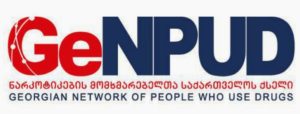 Author: Irma Kakhurashvili, Georgia
Author: Irma Kakhurashvili, Georgia
In Georgia, there are not many organisations working with people who use drugs to improve their health and re-integrate them into the society. New Vector is the first self-organisation of drug users not only in Georgia, but also in the South Caucasus. Since 2006, its activists openly oppose the repressive drug policy, fight for the rights of people who use drugs (PWUD), and search for the innovative approaches to resolve health problems. The main goal of the New Vector is to provide harm reduction services and advocate for the health and social programmes, which are vital for people who use drugs.
In the organisation, drug users are offered free fibroscan liver tests and dentist’s services. Besides, workshops for community members are often held. Every Friday is a woman’s day. Female drug users attend sewing and needlework classes. Since 2016, the organisation also actively provides new services – with mobile clinics, activists and social workers of the organisation test drug users and general population for hepatitis C and HIV both in the capital of Georgia and in the regions.
Staying until the issues are resolved
The New Vector takes part in reforming and humanizing the national drug policy. Several years ago, the Georgian Network of People Who Use Drugs (GeNPUD) was founded at the initiative of the organisation. Through the joint efforts of GeNPUD, different NGOs and activists, amendments were introduced in the law requiring health personnel to call police in case of an overdose. Besides, GeNPUD carried out advocacy activities to exercise the right of drug users to refuse compulsory testing in drug departments of the police granted by article 42 of the Constitution. As a result of the campaigns initiated by the activists of GeNPUD and New Vector, the state ensured access to high-cost new-generation drugs for Hepatitis C treatment in Georgia.
The New Vector holds its position of the leading organisation in the provision of social and prevention services in the area of harm reduction.
“As for HIV/AIDS prevention, for many years we have been implementing harm reduction programmes – syringe and needle exchange. Every day, our social workers go “in the field” and offer sterile syringes and other supplies to people who use drugs. As far as I know, currently there are 6,564 cases of HIV registered in Georgia, with people who inject drugs accounting for 43.2% of such cases,” the head of the New Vector Koka Labartkava is saying. “Last year, when conducting testing in the New Vector we detected 10 cases of HIV, this year we recorded seven cases. If a client has HIV, our social workers assist him in finding specialists and programmes to solve his problems. We stay with our clients until their issues are resolved. In addition to the mobile clinics, drug users can also get tested for HIV, hepatitis and syphilis in our laboratory, right here in the office.”
Problem detected – first step to the solution
The Project “Supporting patients with drug-resistant tuberculosis, taking measures to improve treatment” implemented in five regions of Georgia will be operating as a pilot for 10 months. The Project was launched on 1 July 2017 and, if it proves to be successful, it will be expanded all over the country. The project management team conducted preparatory activities in five cities of Georgia: Tbilisi, Rustavi, Gori, Kutaisi, and Batumi. Multidisciplinary teams have already been formed to include a social worker, a peer consultant and a psychologist. Altogether, six groups have been created, and two of them are in Tbilisi.
 The support team (a social worker, a psychologist and a peer consultant) offer individual and group psychosocial counselling, assistance in solving social problems, psychological and legal consultations, counselling and testing for hepatitis B and C, HIV and syphilis.
The support team (a social worker, a psychologist and a peer consultant) offer individual and group psychosocial counselling, assistance in solving social problems, psychological and legal consultations, counselling and testing for hepatitis B and C, HIV and syphilis.
In September and October this year, the Georgian Network of People who Use Drugs organized information and advocacy sessions for people who use drugs, including those who have HIV and tuberculosis, as well as for different civil society organisations.
The aim of such sessions was to assist the community in defining the challenges and the barriers in terms of access to HIV/AIDS and TB treatment and prevention programmes and in terms of their quality. The sessions allowed defining the gaps at local, national and international levels. Action plans and advocacy tools will soon be defined in relation to each of the gaps.
The New Vector has close partner relations with Tanadgoma within the Task Force City project, stipulating allocation of municipal budget funds for the implementation of HIV/AIDS and tuberculosis prevention programmes. One of the conditions to ensure the effective distribution of resources and developing a municipal public health strategy is for the Mayor of Tbilisi to sign the Paris Declaration‑2014.



